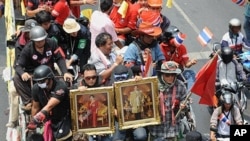For Thais, there may be no more divisive figure than Thaksin Shinawatra. To many of the thousands of anti-government protesters besieging Bangkok, he is their patron. To many others, he is a corrupt politician. But political analysts say the protests have expanded beyond the controversial former prime minister to issues of democratic participation.
Images of Thaksin Shinawatra festoon the anti-government camp in central Bangkok - on banners, posters, hats and shirts.
The former prime minister speaks almost daily to the red-dressed protesters, via satellite communications. He has encouraged their seven-week campaign to force current Prime Minister Abhisit Vejjajiva to step down and call new elections.
Focus on the Countryside
Despite his status as a billionaire media tycoon, thousands of the farmers and laborers who make up the protesters see Mr. Thaksin as their champion.
As prime minister he introduced cheap health care and debt relief, in heavily publicized campaigns.
His critics say Mr. Thaksin was corrupt and authoritarian and abused his power.
Pavin Chachavalpongpun is a research fellow at Singapore's Institute of Southeast Asian Studies. He says Mr. Thaksin's focus on the countryside was so unprecedented that his supporters gloss over corruption allegations.
"Even though they realize that, you know, Thaksin is also a corrupt politician, but then they said, 'Why should we care when, you know, no one in Thailand is really clean anyway?' You know, there are so many corrupt politicians. But, at least, Thaksin is giving back," said Chachavalpongpun.
Financial Moves Questioned
Mr. Thaksin, like his supporters, comes from northern Thailand. Hebegan his career in law enforcement, earning him loyalty among the police.
He made his fortune in the 1980's, building a telecommunications empire. His critics cried foul in 2006 when his family sold shares in one of their assets, the Shin Corporation, to Singapore investors.
The sale was criticized as giving foreigners too much control of Thailand's communications and for allowing Mr. Thaksin's family to avoid paying taxes, through an amendment of a telecommunications law.
He was also criticized for restricting the media and for an anti-drug campaign that led to hundreds of extra-judicial killings.
Despite the controversies, Mr. Thaksin was seen as delivering on promises to help the rural north, earning him credibility that many voters say is rare among Thai politicians.
"Too Powerful"
Mr. Thaksin's populist policies got him elected twice but his abrasive style created enemies among Bangkok's traditional ruling elite.
Marco Bünte does research on Thai politics at the German Institute of Global and Area Studies in Hamburg. He says the turning point came when Mr. Thaksin put too many of his supporters into key positions in the military, Thailand's most powerful institution, responsible for protecting the nation and the monarchy.
"To say it simple, Thaksin was becoming too powerful," he said. "And...it was a danger that the army was fully under Thaksin. And, the other thing what was behind it is the King...The army is very very close to the King."
Colors Arise
In 2006, the army overthrew Mr. Thaksin. Shortly after that, his supporters, known as the red shirts, made their first appearance, to condemn the military's intervention, calling for it to stay out of politics.
The 2007 elections brought to power a government friendly to Mr. Thaksin, underscoring his continued popularity.
Thousands of anti-Thaksin protesters dressed in yellow shirts took to the streets. They occupied key government buildings for months, in a protest that culminated in a one-week siege of Thailand's main international airport.
Eventually, politicized court rulings removed Mr. Thaksin's allies from office in 2008. Parliament selected Mr. Abhisit, head of the Democrat Party, to become prime minister. His cabinet includes several yellow shirts.
A court convicted Mr. Thaksin of corruption and sentenced him to two years in prison. He fled and has since moved from country to country to avoid extradition.
Analysts say the red shirt protest has since expanded from a movement to support Mr. Thaksin to one that includes those fed up with elites in the military and upper class who block democracy.
"Lots of people still think the protester[s] came because Thaksin gave them money. That's so superficial," said Thongchai Winichakul, a professor of history at the University of Wisconsin. "They didn't see that the change is deep and there's no other way because the change has already happened. There's no way to put those rural protesters, those rural people, back into the political condition of 10, 20 years ago. I mpossible. They now call for their share of power. So, in my view, it is a fight for equal democratic rights."
Elections on the Horizon
The government has offered to hold elections at the end of the year, but protest leaders say they should be within three months.
Whenever elections are held, red shirt candidates are expected to come out on top, including those close to Mr. Thaksin.
Many Thais expect the victors will try to toss out Mr. Thaksin's corruption sentence, so he can return to Thailand. And, that could bring the yellow shirts back onto the streets and could plunge the country again into crisis.









